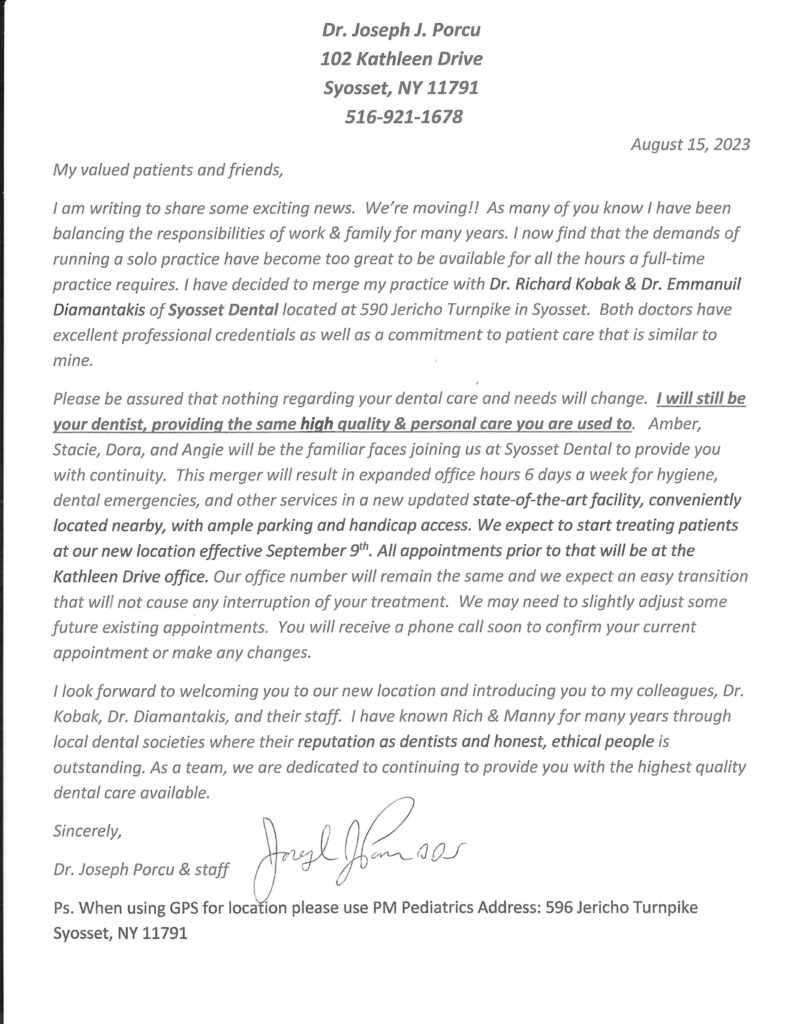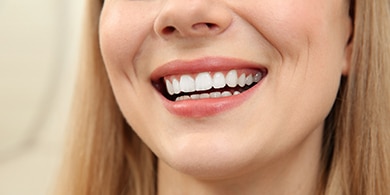 Your smile’s appearance is an important aspect of your dental health, as are the health of your teeth and the integrity of your gum tissues. However, the way your bite functions is also a vital part of your oral health, and patients who experience TMJ disorder often experience difficulty opening and closing their mouths. Because of the complexity of your jaw’s joints, muscles, and nerves, TMJ disorder can also result in a number of other chronic symptoms, including headaches, migraines, jaw and facial pain, and more. (more…)
Your smile’s appearance is an important aspect of your dental health, as are the health of your teeth and the integrity of your gum tissues. However, the way your bite functions is also a vital part of your oral health, and patients who experience TMJ disorder often experience difficulty opening and closing their mouths. Because of the complexity of your jaw’s joints, muscles, and nerves, TMJ disorder can also result in a number of other chronic symptoms, including headaches, migraines, jaw and facial pain, and more. (more…)
Designing Your Full-Mouth Rehabilitation
 The term, “full-mouth rehabilitation,” can seem like a complex procedure, but the truth is that everyone’s treatment plan is different. Depending on your needs, rehabilitating your smile can be as simple as treating a cavity, or as comprehensive as replacing lost teeth and their roots. The goal of full-mouth rehabilitation is to return your smile to an optimal state of health, function, and beauty. Therefore, designing your full-mouth rehabilitation is a personal process where you and your dentist work together to determine the best course of treatment. (more…)
The term, “full-mouth rehabilitation,” can seem like a complex procedure, but the truth is that everyone’s treatment plan is different. Depending on your needs, rehabilitating your smile can be as simple as treating a cavity, or as comprehensive as replacing lost teeth and their roots. The goal of full-mouth rehabilitation is to return your smile to an optimal state of health, function, and beauty. Therefore, designing your full-mouth rehabilitation is a personal process where you and your dentist work together to determine the best course of treatment. (more…)
Gingivitis vs. Gum Disease: Is There a Difference?
 Though gum disease and gingivitis are often used interchangeably, the two terms describe different stages of the same condition. Gingivitis, the first stage of gum disease, is a warning sign, and it may be your last chance to reverse the condition and prevent subsequent dental damage. Once it becomes gum disease, your condition cannot be reversed, and you will need to undergo continuous periodontal maintenance to keep the disease and its symptoms at bay. (more…)
Though gum disease and gingivitis are often used interchangeably, the two terms describe different stages of the same condition. Gingivitis, the first stage of gum disease, is a warning sign, and it may be your last chance to reverse the condition and prevent subsequent dental damage. Once it becomes gum disease, your condition cannot be reversed, and you will need to undergo continuous periodontal maintenance to keep the disease and its symptoms at bay. (more…)
Is It Too Late to Save My Loose Tooth?
 When healthy, your teeth have a very slight give due to the flexibility of the periodontal tissues that support their roots. This gives them just enough wiggle room to properly absorb the most intense of your bite’s pressure. When a tooth is noticeably loose, however, it can no longer function properly, and in many cases, it could be at a high risk of being lost completely. The good news is that it may not be too late to save your loose tooth. If you schedule a visit with your dentist as soon as possible, then he can diagnose why your tooth is loose and prescribe an appropriate treatment plan. (more…)
When healthy, your teeth have a very slight give due to the flexibility of the periodontal tissues that support their roots. This gives them just enough wiggle room to properly absorb the most intense of your bite’s pressure. When a tooth is noticeably loose, however, it can no longer function properly, and in many cases, it could be at a high risk of being lost completely. The good news is that it may not be too late to save your loose tooth. If you schedule a visit with your dentist as soon as possible, then he can diagnose why your tooth is loose and prescribe an appropriate treatment plan. (more…)
What Your Dentist Can Do with Lasers!
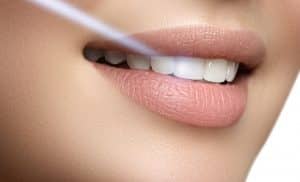 Lasers may have once seemed like a dream of the future, but today, the technology has revolutionized everything from media devices to medical and dental health care. At our dental office, for instance, our experts use specially calibrated diode lasers to perform a number of soft-tissue procedures that traditionally require a scalpel and sutures. With a laser, your dentist can produce more accurate results while making your recovery and healing time quicker and more comfortable. (more…)
Lasers may have once seemed like a dream of the future, but today, the technology has revolutionized everything from media devices to medical and dental health care. At our dental office, for instance, our experts use specially calibrated diode lasers to perform a number of soft-tissue procedures that traditionally require a scalpel and sutures. With a laser, your dentist can produce more accurate results while making your recovery and healing time quicker and more comfortable. (more…)
How Do Digital X-Rays Work?
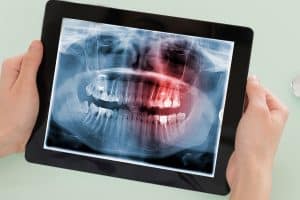 These days, you may see a lot of dentists promoting the use of digital X-rays in their offices and the benefits they provide compared to traditional ones. However, just the term “digital” doesn’t always mean better, so you may still wonder how digital X-rays work, and why you should care. The truth is that digital X-rays aren’t just a tip of the hat to the digital age; the technology allows your dentist to capture high-resolution X-ray images of your teeth and oral structures faster and in a safer manner. This means you spend less time waiting for diagnostic images and your dentist can design a more accurate and effective treatment plan, if necessary. (more…)
These days, you may see a lot of dentists promoting the use of digital X-rays in their offices and the benefits they provide compared to traditional ones. However, just the term “digital” doesn’t always mean better, so you may still wonder how digital X-rays work, and why you should care. The truth is that digital X-rays aren’t just a tip of the hat to the digital age; the technology allows your dentist to capture high-resolution X-ray images of your teeth and oral structures faster and in a safer manner. This means you spend less time waiting for diagnostic images and your dentist can design a more accurate and effective treatment plan, if necessary. (more…)
The Best Ways to Prevent Bruxism
 Bruxism isn’t like cavities or gum disease; there’s no guaranteed hygiene routine to prevent it from occurring. That’s because bruxism, or constant teeth-grinding, can result from a number of issues that don’t always relate to your ongoing dental hygiene. For instance, if you experience excessive stress in your daily life, or if your teeth and/or bite are imbalanced, then you might develop bruxism in spite of excellent hygiene practices. Therefore, the best ways to prevent bruxism are to understand what might cause it, and with help from your dentist, take steps to reduce your risks in each of these areas. (more…)
Bruxism isn’t like cavities or gum disease; there’s no guaranteed hygiene routine to prevent it from occurring. That’s because bruxism, or constant teeth-grinding, can result from a number of issues that don’t always relate to your ongoing dental hygiene. For instance, if you experience excessive stress in your daily life, or if your teeth and/or bite are imbalanced, then you might develop bruxism in spite of excellent hygiene practices. Therefore, the best ways to prevent bruxism are to understand what might cause it, and with help from your dentist, take steps to reduce your risks in each of these areas. (more…)
How Our Patients Benefit from 3D Digital Scanning
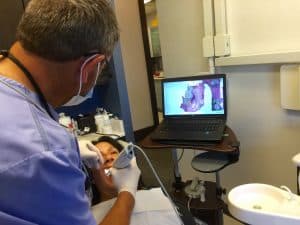 When it comes to restoring your smile, accuracy and realism are paramount. Conventional and implant-supported restorations, such as dental crowns and bridges, work best when they closely mimic the healthy, natural teeth that they’re meant to restore or replace. Traditionally, planning a restoration meant spreading a gel-like substance over your teeth to capture their impression. While effective, this method is often considered cumbersome and messy, especially by patients with strong gag reflexes or who feel slightly claustrophobic. Instead, we utilize the Trios 3Shape digital impression scanner, which creates digital impressions in significantly higher detail using advanced digital imaging rather than a messy gel. (more…)
When it comes to restoring your smile, accuracy and realism are paramount. Conventional and implant-supported restorations, such as dental crowns and bridges, work best when they closely mimic the healthy, natural teeth that they’re meant to restore or replace. Traditionally, planning a restoration meant spreading a gel-like substance over your teeth to capture their impression. While effective, this method is often considered cumbersome and messy, especially by patients with strong gag reflexes or who feel slightly claustrophobic. Instead, we utilize the Trios 3Shape digital impression scanner, which creates digital impressions in significantly higher detail using advanced digital imaging rather than a messy gel. (more…)
What to Know About Porcelain Veneers
 When it comes to creating a smile that you can be proud to show, porcelain veneers are among the most popular cosmetic dentistry options. Veneers are wafer-thin shells that mimic the front surfaces of your teeth, and are made from highly realistic dental porcelain that makes them virtually indistinguishable from healthy tooth structure. Before opting for them, however, you should know the benefits of porcelain veneers and how they can help you restore confidence in your smile. (more…)
When it comes to creating a smile that you can be proud to show, porcelain veneers are among the most popular cosmetic dentistry options. Veneers are wafer-thin shells that mimic the front surfaces of your teeth, and are made from highly realistic dental porcelain that makes them virtually indistinguishable from healthy tooth structure. Before opting for them, however, you should know the benefits of porcelain veneers and how they can help you restore confidence in your smile. (more…)
What Snoring Could Mean, and How to Stop
 Snoring isn’t uncommon, but many people who do it don’t realize that it could be an unhealthy habit. Besides depriving your partner of much-needed sleep, the mechanisms that cause you to snore can also place undue strain on your cardiovascular and systemic wellbeing. Because it is often caused by an irregularity with oral tissues blocking the airway, your dentist may be able to help you stop snoring. He can also help you determine if your snoring is an indication of a more serious problem, such as obstructive sleep apnea (OSA) and recommend an appropriate course of treatment. (more…)
Snoring isn’t uncommon, but many people who do it don’t realize that it could be an unhealthy habit. Besides depriving your partner of much-needed sleep, the mechanisms that cause you to snore can also place undue strain on your cardiovascular and systemic wellbeing. Because it is often caused by an irregularity with oral tissues blocking the airway, your dentist may be able to help you stop snoring. He can also help you determine if your snoring is an indication of a more serious problem, such as obstructive sleep apnea (OSA) and recommend an appropriate course of treatment. (more…)
